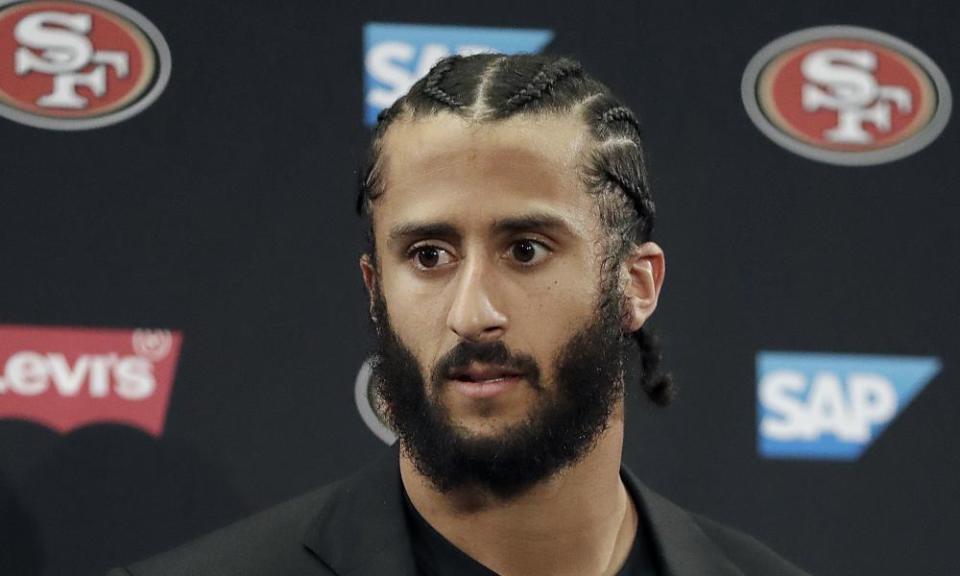Colin Kaepernick was named citizen of the year. How ironic | Ameer Hasan Loggins

It’s been a couple of days, and the news of GQ magazine naming Colin Kaepernick its Citizen of the Year has brought forth both love from some and loathing from others.
Fox News host and columnist, Todd Starnes ventilated his vitriolic views that GQ should have named Kaepernick its, “coward of the year.” Starnes couched his claim in his belief that Colin Kaepernick’s protesting racialized systemic oppression in America is, “not citizenship – that’s cowardice.”
I found Starnes claim to be interesting. Not since that it was a unique take, because it wasn’t. Countless Twitter trolls have said similar things. What I found interesting was Starnes condemnation of Kaepernick by way of contesting his citizenship, as GQ was championing him as their citizen of the year.
Starnes unwittingly reminds us that (both historically and contemporarily) being black in America means that you have an incomplete citizenship.
Starnes comments brings to mind the 1857 Supreme Court decision in the case of Dred Scott (an enslaved African in America) v Sanford, a case in which the court decided that all people of African ancestry – both enslaved as well as those who were free – could never become citizens of the United States.
And while Dred Scott decision was overturned by the 13th amendment (an amendment that allowed for slavery to continue to thrive legally in the prison system) and 14th amendments to the Constitution, history has shown that the spirit of the Dred Scott decision never died in America. It is repeatedly resuscitated, leading to black folks continuous quest for all of the rights promised to citizens of the United States.
According to the US Citizenship and Immigration Services, “Citizenship is the common thread that connects all Americans. We are a nation bound not by race or religion, but by the shared values of freedom, liberty, and equality”.
Was not the desire for the actualization of the promise of, “freedom, liberty, and equality,” for all American citizens the driving force behind the Civil Rights Movement?
If it were not for the incomplete citizenship of Black folks in the United States, there would not have been a reason for the Brown v Board of Education of Topeka decision of 1954, the Civil Rights Act of 1964, and the Voting Rights Act of 1965.
We would not have known the names Rosa Parks, Fannie Lou Hamer, Ella Baker, and Martin Luther King Jr. There would not had been a necessity for groups like the National Association for the Advancement of Colored People, the Southern Christian Leadership Conference, the Student Nonviolent Coordinating Committee (SNCC), the International Code Council, the Nation of Islam and the Black Panther Party to ever be formed to fight for the civil and human rights of people of African ancestry in America.
In a 1963 interview, Louis Lomax asked Malcolm X, “Are not Negroes American citizens,” to which Malcolm X swiftly responded:
If they were citizens, you wouldn’t have a race problem. If the Emancipation Proclamation was authentic, you wouldn’t have a race problem. If the 13th, 14th and 15th Amendments to the Constitution were authentic, you wouldn’t have a race problem. If the Supreme Court desegregation decision was authentic, you wouldn’t have a race problem.
Malcolm X was unflinching in his convictions concerning the incomplete-citizenship of Black people living in America. In his 1964 speech, The Ballot or the Bullet, Malcolm tells the crowd at the King Solomon Baptist Church in Detroit, Michigan:
No, I’m not an American. I’m one of the 22 million black people who are the victims of Americanism. One of the 22 million black people who are the victims of democracy, nothing but disguised hypocrisy. So, I’m not standing here speaking to you as an American, or a patriot, or a flag-saluter, or a flag-waver—no, not I. I’m speaking as a victim of this American system. And I see America through the eyes of the victim. I don’t see any American dream; I see an American nightmare.
What Malcolm X brings into question is, if civil rights protections are routinely denied to black people, and for example, capriciously violated by police officers, by way of racially biased policies such as Stop and Frisk, black Americans being incarcerated in state prisons at an average rate of 5.1 times that of white Americans, and the slew of unarmed black men being killed by police with impunity—how then can one see these attacks their “freedom, liberty, and equality,” and truly feel like a complete citizen in America?
Is this incomplete-citizenship not in many ways what Colin Kaepernick is protesting?
On August 26, 2016, Kaepernick was asked what one of his goals was for protesting during the playing of the Star Spangled Banner, and his response was that he wanted to hold America accountable for what it claims to stand for, “freedom, liberty, and justice for all”. He wanted to magnify how America in theory was not matching America in practice.
In many ways it is somewhat ironic that Kaepernick received GQ’s Citizen of the Year award, because what he is fighting against is the denial of victims of police brutality human rights, and how these rights have been denied to those who have incomplete citizenship in America.
Ameer Hasan Loggins is a doctoral candidate at UC Berkeley in African Diaspora Studies

 Yahoo News
Yahoo News 